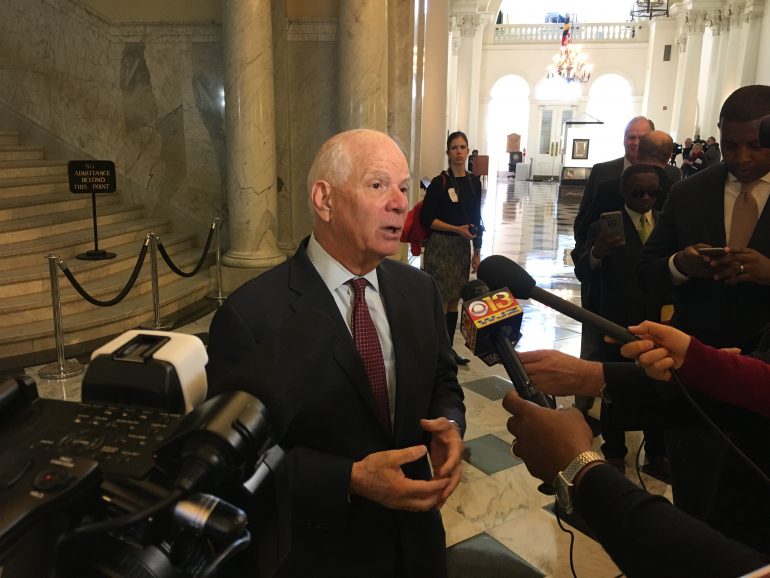ANNAPOLIS — Amid a sea of Maryland state-flag neckties and toddlers in suits, legislators of the Maryland General Assembly gaveled in for the first day of the 2016 session.
Both houses of the Assembly concerned themselves with the formalities of opening day. Senate President Thomas V. “Mike” Miller Jr. and House Speaker Michael Busch, both Democrats, were reinstated in their leadership positions.

Miller formally recognized the senators’ guests, including family members, interns and county executives who populated the crowded gallery section way above the Senate floor.
Miller described the Senate as a family, presenting baby gifts to Minority Leader J.B. Jennings, R-Baltimore County, and Sen. Justin Ready, R-Carroll, who have a newborn girl and boy, respectively.
“Republicans may not be able to produce bills, but they do something else,” Miller joked.

The General Assembly may choose to override six of the bills Gov. Larry Hogan, a Republican, vetoed last year. The Senate scheduled a vote on the vetoes for Jan. 20.
Wednesday morning at Annapolis Summit, a legislative conference sponsored by news, academic and other Maryland organizations, Hogan, a Republican, called discussion of legislative overrides “overdramatic.”
But Democrats, who control both chambers of the General Assembly, were resolute.
“We want to restore some of these veto bills, especially as it relates to ex-felons,” said Senate Majority Leader Catherine Pugh, D-Baltimore.
On the table is the decriminalization of smoking marijuana in public—as well as the legalization of pot-smoking paraphernalia—voting rights for felons on parole or probation, hotel booking taxes, room rental fees in Howard County and restrictions on police seizing assets of less than $300.
Hogan chalked up some of these vetoes, like the bills on marijuana and police seizures, to minor issues with legislation that he hoped would eventually be ironed out in the General Assembly.
He said he was most concerned with the legislation allowing ex-felons to vote.
“Former felons can already vote in Maryland, it’s a misrepresentation of the facts,” Hogan said at the summit. “This is allowing CURRENT felons, who haven’t yet served out their sentences, who are still on parole or probation, who haven’t finalized their debt to society, whether we should allow them to vote. I disagree with it.”
Hogan, a Republican, said that his proposed tax plan, which includes $480 million in tax cuts, is something that Republicans and Democrats should both agree on.
Despite Hogan’s hopes for bipartisan support, Miller and Busch told WEAA radio host Marc Steiner they had not been consulted about the governor’s tax plan.
“The problem is communication,” Miller said. “It’s the same problem between husbands and wives, if you want to stay married, you have to communicate.”
Busch said that education funding is his main priority going into budget deliberations. The governor last year cut expected supplemental education funding — known as GCEI — to some jurisdictions, angering the Democratic establishment.
Hogan’s tax plan, which he announced Tuesday, includes a 3 percent Earned Income Tax credit over one year, similar to a plan proposed by Sen. Richard Madaleno, D-Montgomery, in 2014.
“He’s just trying to accelerate the bill that I passed two years ago, as far as getting the increase,” Madaleno said. “I’m glad that the governor has gotten on with one of my priorities.”
Beyond that, Madaleno was critical of Hogan’s plan.
“He uses very big numbers, rounded up, over multiple years,” Madaleno said.
While most lawmakers were greeting each other and readying for a noon start to the legislature, some spent the morning touting bills and issues they planned to support during the 2016 session.
Several state legislators held a news conference to call for quick action on the Clean Energy Jobs Act, which, according to the Maryland Climate Coalition, would mandate the state increase its minimum clean energy consumption to 25 percent by 2020.
“The bill is a win for the environment, a win for health and a win for the economy,” Madaleno said.

The bill also includes a $40 million plan to train and prepare more people in Maryland for careers in clean energy.
Representatives from Mothers Against Drunk Driving also gathered Wednesday morning and called on the legislature to enact the All-DUI Offender Ignition Interlock Law. This law would require ignition interlocks for convicted drunken-drivers with a blood alcohol concentration of .08 or greater. This device requires the driver to blow into a mouthpiece before starting the vehicle. If the driver is impaired, the device will prevent the engine from being started.
Montgomery County Police Department Traffic Division Director Capt. Tom Didone said he attended the news conference in honor of Officer Noah Leotta, 24, who was on DUI patrol in December when he was struck and killed. Police have charged a man with driving drunk in connection with Leotta’s death.
“The reality of this is you look at this young man and you can’t help but to see a bright a promising person whose life was lost,” said Didone. “This is a person who’s dedicated his life to protecting citizens and removing drunk drivers from the highway and who has his back?”
Other speakers included State Sen. Jamie Raskin, D-Montgomery, Delegate Ben Kramer, D-Montgomery, and MADD Maryland State Program Director Lisa Spicknall.
At the end of the morning summit, outgoing U.S. Sen. Barbara Mikulski, a Democrat, reflected on her long years of service.
She said that she was pleased that there is more minority and female participation in politics, and that technology has made it easier to reach people.
As far as her retirement plans go, she wants to continue working with state officials on issues like combating heroin.
“No golf, the nuns would never let me take up a sport where I had a club in my hands.”
–CNS Correspondents Connor Glowacki and Amber Ebanks contributed to this report.
–30–


You must be logged in to post a comment.